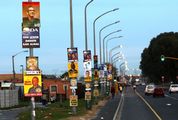FORMER ANC intellectual heavyweight Joel Netshitenzhe, now a sideline commentator like so many alienated veterans, recently wrote "a few individuals in the liberation movement either do not have any, or lose all, sense of compunction or shame, reflecting what are essentially psychopathic tendencies".
It is a remarkable sentiment. But the idea South African politicians suffer some kind of affliction is nothing new. No less than President Jacob Zuma has said, "It’s not just with ordinary people, it’s even in Parliament. We need to be cured. We’re sick."
Of course the president thinks it’s everyone else who is infected. He is A-OK. As is the ANC. Let that be a warning to anyone who tries to self-diagnose.
In 2012, he even went so far as to call for a “national cleansing ceremony” to heal the country, so he is quite keen on a cure for others, even if he cant see the consequences in himself.
But if the truth be told, whatever the many and various sicknesses to plague SA, our politics and politicians demonstrate some of the most severe illnesses. What are some of the worst of these?
Identifying these ailments is not an entirely flippant exercise. Some of the patterns of behaviour associated with them are so well set, consistent and prevalent that they might as well be legitimate sicknesses. Others, even if more rare, still manifest like a sickness, the victim seemingly held hostage by the symptoms.
Here is a guide to some of the more common South African political sicknesses.
1. Acolyte Fever:
Description: A sudden loss of independence that can result in the subversion of one’s public obligations in favour of a political agenda.
Symptoms: Inaccurate reporting; profuse sweating under cross-examination.
Side Effects: Humorous videos
Famous cases: While this particular sickness is rife in SA, with many and various strains currently infecting the upper echelons of power, Police Minister Nathi Nhleko has demonstrated some of the most severe symptoms. His report into the security upgrades at Nkandla, accompanied by a Keystone Cops video of local members of the fire service trying to demonstrate a swimming pool’s use as a fire hydrant, effectively bypassed and tried to usurp the findings of the public protector. In doing so, he strove to exonerate the president from any and all responsibility.
2. Criminal Inflammation
Description: Criminal Inflammation attacks a person’s principles system, rendering it immune to the ideals that define human rights and justice in the face of some ostensibly political advantage.
Symptoms: The embracing of despots, arsonists and kidnappers; confusion about the rule of law.
Side Effects: Photographs of convicted criminals on party T-shirts.
Famous Cases: A violent strain of Criminal Inflammation infected the DA in 2013, when it gleefully signed up AbaThembu King Buyelekhaya Dalindyebo as a member, despite a serious criminal conviction. Acute cases were recorded in then-national spokesman Mmusi Maimane, who described the move as "symbolic of our politics" and Eastern Cape leader Athol Trollip, who said he was "very proud" to have personally secured the king’s signature. Later the DA would insist the conviction counted for little until the appeal had been heard. Regardless, the appeal confirmed the worst.
3. Idi Amin Madness
Description: A disjuncture between competence and ego, augmented by disproportionate power, that results in a tyrannical disposition, in which reasonableness and good judgment are overpowered by authoritarianism and arbitrariness.
Symptoms: An aversion to criticism; incomprehensible statements; political deference; ignorance; feigned superiority; contempt for intellectualism.
Side Effects: Choirs and praise songs dedicated to your munificence; uniforms.
Famous Cases: It’s another widespread disease, with numerous victims across the South African political landscape and particularly within the ANC. Nevertheless, typified by the SABC chief operating officer Hlaudi Motsoeneng who, so infected, is capable of bamboozling just as he is alarming. Idi Amin Madness is highly contagious and, unchecked, is capable of spreading through entire institutions.
4. Hypocrisy Disorder
Description: An ideological disturbance whereby one’s stated aims cannot be reconciled with one’s actual actions.
Symptoms: The embracing of attitudes and behaviours that constitute the antithesis of one’s ostensible ideological values and then defending them as entirely compatible with them.
Side Effects: Hypocrisy; double-speak; obfuscation; bluster and cant
Famous Cases: A stand-out example of Hypocrisy Disorder is from South African Communist Party general secretary Blade Nzimande, who in 2009, as minister for higher education, saw his department purchase for him a R1.1m BMW 705i. A week or two earlier Nzimande had called on South Africans to "roll back the greed, corruption and selfishness of capitalism". But, faced with having to defend the purchase, his department would describe it as a "necessity". Hypocrisy Disorder is omnipresent.
5. Identity Complex
Description: Victims suffer a compulsion to abandon any sense of individuality and coalesce around stereotypes or archetypes as the all-defining label for every aspect of one’s personality and experience.
Symptoms: Generalisation; group think; collectivist thought.
Side Effects: A desire to smear excrement.
Famous Cases: Identity Complex currently infects a wide range of abstract and particular groups and organisations in SA. Typically, those members of the same group who do not share the stereotypical symptoms advocated by those infected are rejected as outcasts and alien to whatever collectivist project the group has attached. Irony is one of the first things to be wiped out by Identity Complex.
6. Manifesto Infection
Description: The full Latin name for Manifesto Infection translates as Populism Over-extension. It results in a political party making promises it cannot keep, particularly in its manifesto. Its onset is generally realised by a lack of meaningful consequences.
Symptoms: Demagogic behaviour; exaggeration.
Side Effects: Uncritical press coverage.
Famous Cases: The EFF’s manifesto states, "The EFF People’s Municipality will pass by-laws which will expropriate and allocate land equitably to all residents of the Municipality for residential, recreational, industrial, religious, and agricultural purposes and activities with the principle of use it or lose it." Africa Check, says this is not possible as things stand. The EFF says it would go to court, but its manifesto makes no attempt to explain its proposed law cannot currently be realised. One of the effects of Manifesto Infection is to render the victim unable to reasonably manage expectations.
7. Austerity Resistance
Description: Once infected, a person is unable to appreciate the socioeconomic conditions affecting the general populace. Thus, an individual will indulge in behaviour that is excessive and self-serving even when the pressure to scale back and observe prudence is acute; indeed, even when there are express executive directives to be frugal.
Symptoms: Luxury cars; five-star hotel rooms; expensive meals; overseas trips; security upgrades and renovations; extravagant parties and events.
Side Effects: A detached sense of personal responsibility born of the knowledge that someone else will foot the bill.
Famous Cases: If other sicknesses are widespread, Austerity Resistance is a plague, having brought public representatives across the country, aside from perhaps the Western Cape, to their knees. Doctors, in the form of the Treasury, have prescribed numerous treatments, but to no avail. The sickness is too advanced and ravages politicians and public servants alike. Even when the prospect of recession or "junk status" is applied as a potential immunisation programme, the virus seems to have mutated, resisting anything political science can throw at it.
8. Apartheid Disease
Description: The inability to disassociate present abhorrent behaviour from past injustice.
Symptoms: A lack of accountability; irrationality.
Side Effects: Obfuscation; excuse; double-talk.
Famous Cases: Zuma experienced a violent bout of Apartheid Disease when put under pressure to explain the failure of Limpopo’s department of education to deliver textbooks on time, 20 years after democracy, choosing instead to blame Hendrik Verwoerd. "We are not dealing with a problem of today; we are solving a problem of centuries (ago)."
9. Golf Syndrome
Description: A malfunction of a person’s justice system whereby convicted criminals, through political connections, ease through their punishment or are rendered immune to those consequences ordinary citizens suffer.
Symptoms: Perks and privileges in prison; lenient sentences; early parole; a hero’s send-off before incarceration.
Side Effects: A lot of time in the hospital ward.
Famous Cases: Patient zero was Tony Yengeni, who served just four months of a four-year prison sentence for fraud, before being released on early parole. However, the sickness is exemplified by Schabir Shaik, who to this day suffers the affliction. He was supposed to be dead, according to the parole authorities, but available evidence suggests he is strong enough, at least, to complete a round of golf. So, ironically, Golf Syndrome is ultimately the absence of any sickness in the first place.
10. Instability Itch
Description: Instability Itch manifests as a compulsion to disrupt or destabilise order by introducing chaos and uncertainty into a situation.
Symptoms: Randomness; irresponsibility; patronage.
Side Effects: 62% support in a general election
Famous Cases: At its most severe, Instability Itch is best exemplified by Zuma, who appears to demonstrate an incurable impulse to undermine institutions, departments and state bodies that show some semblance of efficiency by imposing on them an individual who serves primarily a patronage-related agenda rather than one based on competence or the best interests of the country. The best example of all these is his decision to appoint the then inexperienced Des van Rooyen as finance minister. Treating the symptoms of Instability Itch can be monumental. In the case of Van Rooyen the consequences ran into billions of rand. But for the victim, the political costs seem negligible.




















